SPECTATOR
We did not say in our memorandum that Desmond Clarke had been silenced after Yugoslav press criticism : we said that his talks had ceased after such criticism (Mr. Clarke was attacked by Borba, the chief Com- munist paper, on a number of occasions).
In his letter to us last week Mr. Clarke said that the talks came to an end 'principally because of my own reluctance to continue them'; but he admits that they ended 'partly because of criticism from our Embassy in Belgrade.' The BBC omits this information; and it also omits to say that the type of broadcast that Mr. Clarke was doing was discontinued— in spite of its great popularity; recorded by (among others) Martin Eslin after his trip to Yugoslavia in 1954.
The BBC has not understood the point we were making in our mem- orandum. The same news and comment programmes go out to all the countries in Eastern Europe; and these contained references to the Yugo- slav vote on Hungary, and the prison sentences on the Social Demo- crats. Our complaint was that no special comment was made on the Yugo-
SPECTATOR
slay programmes. These programmes are deliberately left flexible to enable news and comment to be amplified when it concerns an individual country; but in cases where the news might embarrass the Yugoslav authorities it is rejected as 'not newsworthy.'
A very interesting coincidence! Mr. Kolarz enjoys a world-wide rere tation as an expert on Communism and on Eastern Europe; and he has been with the BBC for many years. Perhaps the BBC would like to tell us how many times previously he has been commissioned to write talks on Yugoslavia, in which criticism of the regime has been encouraged?
We said that there was no press round-up in December, January 01 February, and in fact there was one in December. This was certainly a mistake, but the BBC's comment only strengthens our case. Our cool' plaint was that the press review had been stopped altogether for a year 'and only half-heartedly resumed after the correspondence in the SpectatOr began' (incidentally, did they contain any reference to the correspondence in the Spectator?). The BBC now confirms the truth of our assertion. Who decides whether 'news is sufficiently interesting or important' for comment? Popovic was disinterred here in November, 1959, to be reinterred with macabre pomp in Belgrade—which suggests that people in Yugoslavia must have been interested. Over here, the Guardian con• ducted a lively correspondence on the business;, an MP, the Yugoslav press attachd, the veteran Yugoslav Socialist leader Mr. Topalovic and others found it interesting enough to write about, So did the SraL (December 1, 1959). And in Belgrade, high party and State officials joined in honouring Popovic's remains. Yet the BBC did not think the subject interesting enough. Well, well . . .
The Djilas case is neither 'delicate' nor 'difficult'; it is perfectly straight- forward. A man who dared to recognise he had been in error spoke uP about it, and was brutally silenced and imprisoned for his courage in doing so. That the BBC should feel more concerned about the susceptibilities rd his gaolers than about the British viewpoint is precisely what we are com- plaining about. The decision to broadcast extracts of Djilas's book on other national services, but not to Yugoslavia, is the most disgraceful episode in this whole business.
We must apologise for inadvertently telescoping a note made at the time of Mrs. Castle's letter. But again, the mistake does not affect our argument. Later in the same letter (as the BBC admits) Mrs. Castle did express her views on the Djilas affair. 'Yugoslavia is in danger,' she wrote, 'of losing some of her best friends in this country by actions of this kind' (bringing Djilas to trial).. Yet the BBC, which had given her earlier views in full, now admits that Mrs. Castle's letter was not used• Why not?
Of all the BBC's evasions in their memorandum, this is really the most abject. Events which were rightly rated of world interest by the author, Mr. M. Latey •(now head of the East European Services of the BBC) and used in the other services, were cut out of the script to be broadcast to the country where the events had actually taken place. Who was 'the responsible editor' who decided on this censorship? And if this was his idea of ensuring a 'fair and balanced view,' was he immediately replaced? Such excuses. are 1984 double-talk of the most unpleasant type; and it is astonish- ing to see the BBC trying to justify them.
The BBC, we note, does not, attempt to deny our charge that the press round-up for that month was tilted against Djilas; or that the broadcast of Morgan Phillips's protest was used only on the noon transmission (an unimportant one), and cut out later; or that there was no special comment either by an outside contributor or a BBC commentator.
SPECTATOR
It is interesting to hear that the BBC knew as long as seven years ago that the Yugoslav service had been used by some Communists to transmit propaganda. May we ask whether any disciplinary action was taken at the time? Was anybody censured? And if the BBC will open its files to inspection by an independent inquiry we will be glad to help them find the reference to the dockers' strike.
Mr. Dedijer is in the US; we are content to await his own version of the case.
This explanation sounds very thin. The great majority of people imported have' been no asset to the service either as broadcasters or translators. Their Serbo-Croat may have been good, but their English has often been pathetic (one of them translated 'Board of Trade' as 'Seamen's Union' (board—'on board'); and another translated 'international affairs' as 'inter- national "affairs"' (scandals). One news bulletin translated contained no less than fourteen errors in a fifteen-minute programme. Candidly, we cannot accept the BBC's explanation that these people were employed 'to improve the quality of the broadcasts'—even if our own one is not correct.
What they have done, admittedly, is introduce Communist jargon into broadcasts; and very. unappetising some of it is, too.
The BBC does not comment, we note, on our allegation that some of these people established a Communist cell in Bush House. If the Corpora- tion is 'aware of the pressures to which citizens of totalitarian countries are subject in such circumstances' why is something not done abotut it?
We regret the mistake over listener reports; but even if they do not actually contain names and addresses, the anxiety of the Embassy to get hold of them is surely significant.
According to the BBC the news of the death of Bishop Velimirovic was dropped from a bulletin `by the responsible editor in the news room.' in a letter in our correspondence columns this week Mr. Bozovic, the trans- lator, says he was responsible for the change. Who is speaking the truth?
The reason Mr. Bozovic gives is typical of the flimsiness of the 'not important as news' excuses: one might just as well say no reference should be made to the death of an.Archbishop of Canterbury in the morning news bulletins because it has been on the bulletins the night before.
Branovic, a Yugoslav, was playing at Wimbledon. He was well enough known for the BBC's news room to mention him in a general news item;
SPECTATOR
but his name was deliberately and arbitrarily removed by a translator for political reasons. Yet the BBC continues to assert that members of the staff have had no say in such matters!
We do not want to go into linguistic detail, but our Serbo-Croat experts maintain that Miss Zikovic's translation was incorrect. In any case, this is a technicality. 'Sentenced for alleged collaboration with the Nazis' was given a different meaning in the translation whichever way—the BBC's or ours—you look at it. There is a perfectly good word for 'alleged' (navodul) in the language. And why condemn the phrase as 'a loose and inaccurate formula?' It seems succinct to us.
There is no shortage of Serbo-Croat speaking citizens in England; but there is, unfortunately, a shortage of Serbo-Croat speakers who are suitable for this purpose, because the BBC has been unable to retain their services. They have not liked the political atmosphere to which they are expected to conform in Bush House. If there is a shortage, it is the BBC who is to blame. In any case, after the treatment given to Mr. Valentine in Yugo' slavia it is hardly surprising that nobody but a Titoist would care to risk going there.
We are grateful to the BBC for at least admitting the truth of our allega• tions about Mr. Valentine. When we said they tried to hush up the case we were not thinking of futile protests to Yugoslav; we were referring to the fact that this important story was hushed up in this country.
'It is not the practice of the BBC to publish their reasons for such decisions.' In that case the BBC can hardly cothplain if the victims of such decisions—sacked with no reason given, perhaps, and at short notice— take their case to the press. We will publish Mr. Gregovic's reply in our correspondence columns next week. Suffice to say for the present that we are inclined to believe his version rather than the BBC's.
In seven years, thirty million words. And how many of them were critical of the Yugoslav regime? That is . the question we asked in our memorandum; yet the BBC has had nothing to say on this subject.
The item was only an example, not our sole source of information. We had a number of letters expressing the same view, some of them smuggled out of Yugoslavia.
SPECTATOR
Slovenes comprise no more than a tenth of the population of Yugo- slavia, and are far from typical of the country. It is hardly surprising that Radio Madrid is not popular among them, as it does not happen to broad- cast in Slovene—only in Serbo-Croat, an altogether different language.
In any case, the BBC appears to forget that Yugoslavia is a police state, where the privacy of the mail is not respected. For this reason reactions hostile to the regime (or friendly to hostile elements, such as Radio Madrid) would rarely be sent through the post.
The BBC's figures may be correct, but their interpretation is comical. Of course a lot of people want to learn English, and the lessons are very popular (English, incidentally, is the language most useful for a prospec- tive refugee to know) ; but they are provided by a different branch—not the Yugoslav service. Nor is there any risk involved in commenting favour- ably on the BBC's broadcasts. There would be a risk, and a very serious one, if anybody commented unfavourably on a service with which the Tito Government is so satisfied.
Since our memorandum was written its opinions have been confirmed in an article from Belgrade by Alan Green, correspondent of Reynolds News. Green vouches for the truth of our charges and says 'where, to sober listeners in Yugoslavia, the BBC has fallen down is in the delicate caution with which it tiptoes around when the Yugoslays do something about which, rightly or wrongly, Western opinion is aroused,' and, though he goes on to defend the BBC's decision to have a special policy for Yugo- slavia 'it is quite another matter for the BBC to carry this to the point of surrendering any right of criticism.'

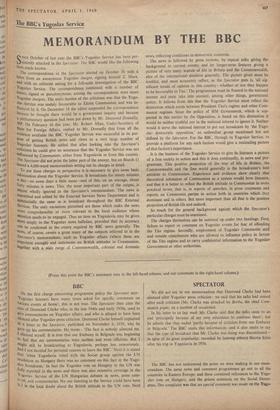
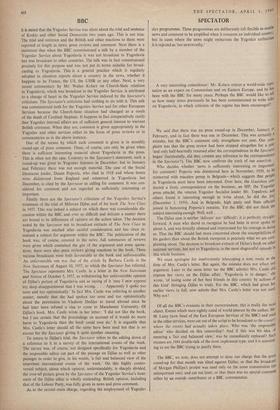
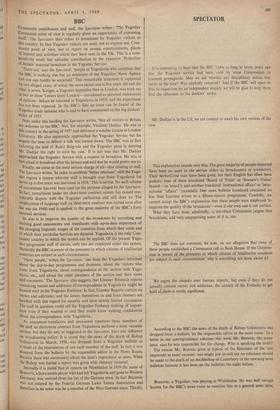
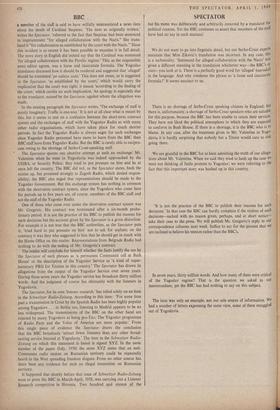
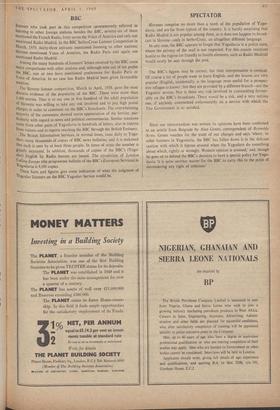
































 Previous page
Previous page